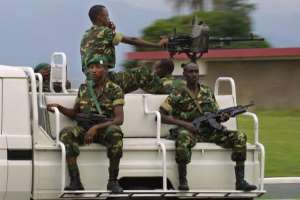
Bujumbura (Burundi) (AFP) - At least 14 fighters were killed on Tuesday in clashes between Burundian security forces and members of an unidentified armed group who came from the Democratic Republic of Congo, officials said.
Burundian officials and witnesses said the armed group crossed into Cibitoke province north of the capital Bujumbura during the night, but that Burundian soldiers and police had managed to gain the upper hand after a day of fighting.
"The fighting has just come to an end. I myself counted 14 bodies of attackers who were killed in the fighting," the governor of Cibitoke province, Anselme Nsabimana, told AFP.
He said security forces had prevented the group from reaching the Kibira forest, an area used in the past as a base to stage further attacks inside Burundi.
Burundi's army spokesman, Colonel Gaspard Baratuza, said the attackers were now on the run, but said authorities had yet to establish what group they were from.
"Our soldiers are pursuing them. Roadblocks have been put up so that they don't escape," he said, adding that reinforcements had been sent to the area.
A local witness said around 200 fighters armed with assault rifles and grenade launchers crossed into the country from DRCongo's eastern Kivu region, a chronically unstable and resource-rich area that is home to dozens of rebel groups.
Fighting has been concentrated around Buganda, situated 50 kilometres (30 miles) north of the capital Bujumbura, and officials said thousands of residents had fled the area.
Previous attacks in Burundi's border region have been claimed by a splinter faction of the National Liberation Forces (FNL), whose full name is Party for the Liberation of the Hutu People.
The main body of FNL -- a highly disciplined group notorious for singing hymns as they carried out attacks -- signed a peace deal with the Burundian government in 2009 and have since become a political party.
The rebels who still fight on have claimed a string of attacks this year, most recently in October when they claimed to have killed six soldiers, and vowed to "intensify" their raids ahead of presidential elections in June 2015.
The group, however, denied they were behind the latest attack.
Burundi, a small nation in Africa's Great Lakes region, emerged in 2006 from a brutal 13-year civil war and its political climate remains fractious ahead of the polls.
President Pierre Nkurunziza, in power since 2005, is expected to run for a third term in office next year despite opponents' claims that that would violate Burundi's constitution.
Burundi's last elections in 2010 were boycotted by most opposition parties, and Nkurunziza's opponents are again accusing the ruling CNDD-FDD party of eliminating any dissent ahead of the next polls.




 There’s nothing you can do for us; just give us electricity to save our collapsi...
There’s nothing you can do for us; just give us electricity to save our collapsi...
 Ghanaian media failing in watchdog duties — Sulemana Braimah
Ghanaian media failing in watchdog duties — Sulemana Braimah
 On any scale, Mahama can't match Bawumia — NPP Youth Organiser
On any scale, Mahama can't match Bawumia — NPP Youth Organiser
 Never tag me as an NPP pastor; I'm 'pained' the 'Akyem Mafia' are still in charg...
Never tag me as an NPP pastor; I'm 'pained' the 'Akyem Mafia' are still in charg...
 Your refusal to dedicate a project to Atta Mills means you never loved him — Kok...
Your refusal to dedicate a project to Atta Mills means you never loved him — Kok...
 2024 elections: I'm competent, not just a dreamer; vote for me — Alan
2024 elections: I'm competent, not just a dreamer; vote for me — Alan
 2024 elections: Forget NPP, NDC; I've the Holy Spirit backing me and nothing wil...
2024 elections: Forget NPP, NDC; I've the Holy Spirit backing me and nothing wil...
 2024 elections: We've no trust in judiciary; we'll ensure ballots are well secur...
2024 elections: We've no trust in judiciary; we'll ensure ballots are well secur...
 Performance tracker: Fire MCEs, DCEs who document Mahama's projects; they're not...
Performance tracker: Fire MCEs, DCEs who document Mahama's projects; they're not...
 Train crash: Railway ministry shares footage of incident
Train crash: Railway ministry shares footage of incident
